K11-Linked Polyubiquitination in Cell Cycle Control Revealed by a K11 Linkage-Specific Antibody.
Matsumoto, M.L., Wickliffe, K.E., Dong, K.C., Yu, C., Bosanac, I., Bustos, D., Phu, L., Kirkpatrick, D.S., Hymowitz, S.G., Rape, M., Kelley, R.F., Dixit, V.M.(2010) Mol Cell 39: 477-484
- PubMed: 20655260
- DOI: https://doi.org/10.1016/j.molcel.2010.07.001
- Primary Citation of Related Structures:
3NOB - PubMed Abstract:
Polyubiquitination is a posttranslational modification where ubiquitin chains containing isopeptide bonds linking one of seven ubiquitin lysines with the C terminus of an adjoining ubiquitin are covalently attached to proteins. While functions of K48- and K63-linked polyubiquitin are understood, the role(s) of noncanonical K11-linked chains is less clear. A crystal structure of K11-linked diubiquitin demonstrates a distinct conformation from K48- or K63-linked diubiquitin. We engineered a K11 linkage-specific antibody and use it to demonstrate that K11 chains are highly upregulated in mitotic human cells precisely when substrates of the ubiquitin ligase anaphase-promoting complex (APC/C) are degraded. These chains increased with proteasomal inhibition, suggesting they act as degradation signals in vivo. Inhibition of the APC/C strongly impeded the formation of K11-linked chains, suggesting that a single ubiquitin ligase is the major source of mitotic K11-linked chains. Our results underscore the importance of K11-linked ubiquitin chains as critical regulators of mitotic protein degradation.
- Department of Antibody Engineering, Genentech, Inc., South San Francisco, CA 94080, USA.
Organizational Affiliation:

















